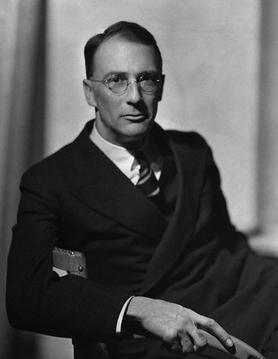
Cecil Louis Troughton Smith, known by his pen name Cecil Scott "C. S." Forester, was an English novelist known for writing tales of naval warfare, such as the 12-book Horatio Hornblower series depicting a Royal Navy officer during the Napoleonic Wars.

The Battle of Trafalgar was a naval engagement that took place on 21 October 1805 between the British Royal Navy and the combined fleets of the French and Spanish Navies during the War of the Third Coalition of the Napoleonic Wars (1803–1815).
Horatio Hornblower is a fictional officer in the British Royal Navy during the Napoleonic Wars, the protagonist of a series of novels and stories by C. S. Forester. He later became the subject of films and radio and television programmes, and C. Northcote Parkinson elaborated a "biography" of him, The True Story of Horatio Hornblower.
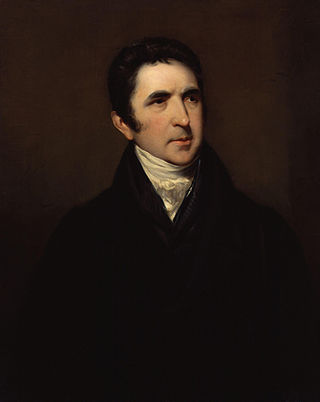
Sir John Barrow, 1st Baronet, was an English geographer, linguist, writer and civil servant best known for serving as the Second Secretary to the Admiralty from 1804 until 1845.

The Happy Return is the first of the Horatio Hornblower novels by C. S. Forester. It was published in 1937. The American title is derived from the expression "beat to quarters", which was the signal to prepare for combat. This book is sixth by internal chronology of the series. Hornblower's past history as described here does not entirely accord with his history as revealed in the stories written later, but Forester never revised the book.
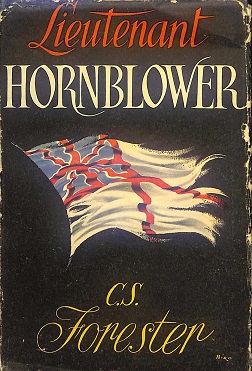
Lieutenant Hornblower is a Horatio Hornblower novel written by C. S. Forester. It is the second book in the series chronologically, but the seventh by order of publication.
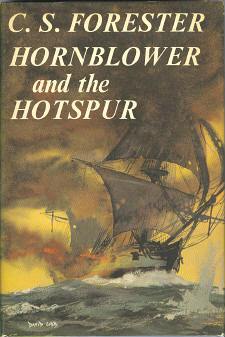
Hornblower and the Hotspur is a Horatio Hornblower novel written by C. S. Forester.

In the Battle of Cape Finisterre off Galicia, Spain, the British fleet under Admiral Robert Calder fought an indecisive naval battle against the combined Franco-Spanish fleet which was returning from the West Indies. In the ensuing battle the British captured two Spanish ships of the line, but failed to prevent the joining of French Admiral Pierre de Villeneuve's fleet to the squadron of Ferrol and to strike the shattering blow that would have freed Great Britain from the danger of an invasion. Calder was later court-martialled and severely reprimanded for his failure and for avoiding the renewal of the engagement on 23 and 24 July. At the same time, in the aftermath Villeneuve elected not to continue on to Brest, where his fleet could have joined with other French ships to clear the English Channel for an invasion of Great Britain.

Admiral Sir Robert Calder, 1st Baronet, was a Royal Navy officer who served in the Seven Years' War, the American Revolutionary War, the French Revolutionary Wars and the Napoleonic Wars. For much of his career he was regarded as a dependable officer, and spent several years as Captain of the Fleet under Admiral Sir John Jervis. However, he is chiefly remembered for his controversial actions following the Battle of Cape Finisterre in 1805 which resulted in his court-martial. Though he was removed from his sea command, he was retained in the Navy and later served as Commander-in-Chief of the base at Plymouth.

Les Casquets or (The) Casquets is a group of rocks eight miles (13 km) northwest of Alderney in the Channel Islands; they are administered by the Bailiwick of Guernsey. The rocks are part of an underwater sandstone ridge. Other parts which emerge above the water are the islets of Burhou and Ortac. Little vegetation grows on them.
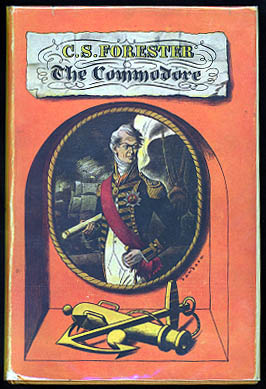
The Commodore is a Horatio Hornblower novel written by C. S. Forester. It was published in the United States under the title Commodore Hornblower.
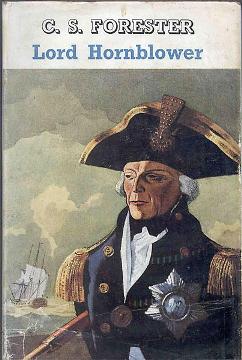
Lord Hornblower is a Horatio Hornblower novel written by C. S. Forester, originally intended to be the last in the series.

Hornblower in the West Indies, or alternately Admiral Hornblower in the West Indies, is one of the novels in the series that C. S. Forester wrote about fictional Royal Navy officer Horatio Hornblower.
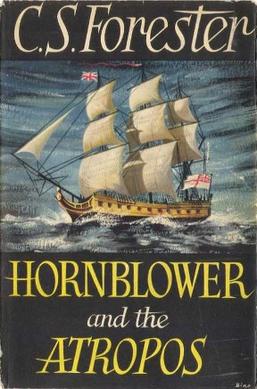
Hornblower and the Atropos is a 1953 historical novel by C.S. Forester.
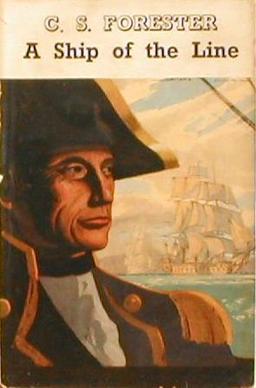
A Ship of the Line is an historical seafaring novel by C. S. Forester. It follows his fictional hero Horatio Hornblower during his tour as captain of a ship of the line. By internal chronology, A Ship of the Line, which follows The Happy Return, is the seventh book in the series. However, the book, published in 1938, was the second Hornblower novel completed by Forester. It is one of three Hornblower novels adapted into the 1951 British-American film Captain Horatio Hornblower R.N..
"The Last Encounter" is a short story by C. S. Forester which provides the final chapter in the life of his fictional naval hero Horatio Hornblower. It first appeared in the 8 May 1966 Sunday Mirror. The following year it was published together with the unfinished novel Hornblower and the Crisis and another short story, "Hornblower and the Widow McCool".

The Trafalgar campaign was a long and complicated series of fleet manoeuvres carried out by the combined French and Spanish fleets; and the opposing moves of the Royal Navy during much of 1805. These were the culmination of French plans to force a passage through the English Channel, and so achieve a successful invasion of the United Kingdom. The plans were extremely complicated and proved to be impractical. Much of the detail was due to the personal intervention of Napoleon, who as a soldier rather than a sailor failed to consider the effects of weather, difficulties in communication, and the Royal Navy. Despite limited successes in achieving some elements of the plan the French commanders were unable to follow the main objective through to execution. The campaign, which took place over thousands of miles of ocean, was marked by several naval engagements, most significantly at the Battle of Trafalgar on 21 October, where the combined fleet was decisively defeated, and from which the campaign takes its name. A final mopping up action at the Battle of Cape Ortegal on 4 November completed the destruction of the combined fleet, and secured the supremacy of the Royal Navy at sea.
Loyalty is the seventh film of the British TV film series Hornblower, based on the books by C. S. Forester, particularly Hornblower and the Hotspur. It was released on 5 January 2003, nearly four years after the first four films and nine months after the next two films.
Duty is the eighth and final episode of the British TV series Hornblower, based on the 1962 book Hornblower and the Hotspur by C.S. Forester. It was released on 6 January 2003, a day after episode 7: Loyalty.














